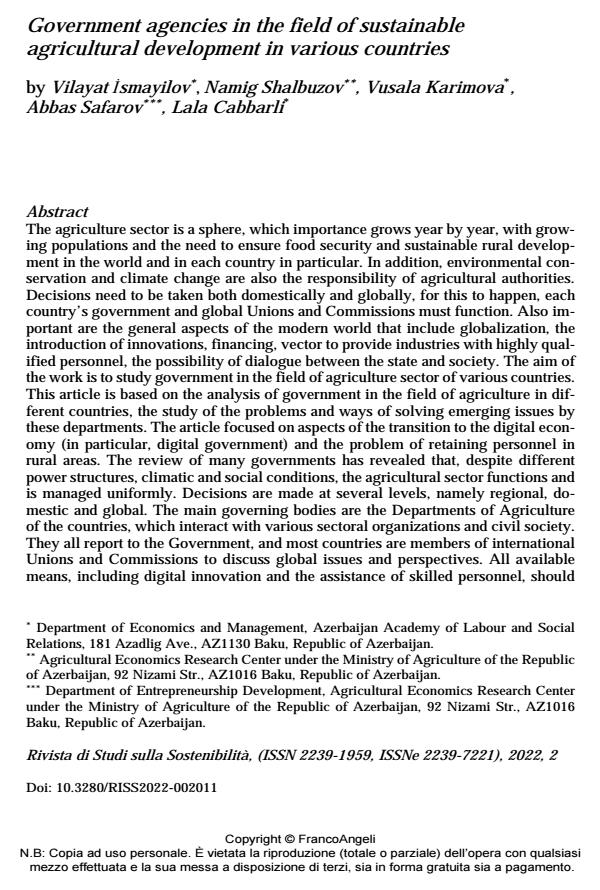Government agencies in the field of sustainable agricultural development in various countries
Titolo Rivista RIVISTA DI STUDI SULLA SOSTENIBILITA'
Autori/Curatori Vilayat Ismayilo, Namig Shalbuzov, Vusala Karimova, Abbas Safarov, Lala Cabbarli
Anno di pubblicazione 2023 Fascicolo 2022/2
Lingua Inglese Numero pagine 19 P. 165-183 Dimensione file 101 KB
DOI 10.3280/RISS2022-002011
Il DOI è il codice a barre della proprietà intellettuale: per saperne di più
clicca qui
Qui sotto puoi vedere in anteprima la prima pagina di questo articolo.
Se questo articolo ti interessa, lo puoi acquistare (e scaricare in formato pdf) seguendo le facili indicazioni per acquistare il download credit. Acquista Download Credits per scaricare questo Articolo in formato PDF

FrancoAngeli è membro della Publishers International Linking Association, Inc (PILA)associazione indipendente e non profit per facilitare (attraverso i servizi tecnologici implementati da CrossRef.org) l’accesso degli studiosi ai contenuti digitali nelle pubblicazioni professionali e scientifiche
The agriculture sector is a sphere, which importance grows year by year, with grow-ing populations and the need to ensure food security and sustainable rural development in the world and in each country in particular. In addition, environmental conservation and climate change are also the responsibility of agricultural authori-ties. Decisions need to be taken both domestically and globally, for this to happen, each country’s government and global Unions and Commissions must function. Also important are the general aspects of the modern world that include globaliza-tion, the introduction of innovations, financing, vector to provide industries with highly qualified personnel, the possibility of dialogue between the state and socie-ty. The aim of the work is to study government in the field of agriculture sector of various countries. This article is based on the analysis of government in the field of agriculture in different countries, the study of the problems and ways of solving emerging issues by these departments. The article focused on aspects of the transi-tion to the digital economy (in particular, digital government) and the problem of retaining personnel in rural areas. The review of many governments has revealed that, despite different power structures, climatic and social conditions, the agricul-tural sector functions and is managed uniformly. Decisions are made at several levels, namely regional, domestic and global. The main governing bodies are the Departments of Agriculture of the countries, which interact with various sectoral organizations and civil society. They all report to the Government, and most coun-tries are members of international Unions and Commissions to discuss global is-sues and perspectives. All available means, including digital innovation and the assistance of skilled personnel, should be used for the success and development of all governments, in fact, precisely these aspects are the most relevant areas of pub-lic administration development.
Parole chiave:digital government, agricultural sector, state support, management, public administration.
- Development of small and medium-sized enterprises in Kazakhstan: structural analysis Dina Aibossynova, Nazym Uruzbayeva, in Scientific Herald of Uzhhorod University Series Physics /2024
DOI: 10.54919/physics/55.2024.73ra9 - Agricultural enterprise economic security systems modelling Oleksandra Kuzmenko, Maryna Chyzhevska, in Scientific Horizons /2024 pp.143
DOI: 10.48077/scihor3.2024.143 - Circular economy as an imperative for sustainable development Olena Dovgal, Tetiana Borko, Nataliia Miroshkina, Hanna Surina, Dmytro Konoplianyk, in Scientific Bulletin of Mukachevo State University Series “Economics” /2024 pp.19
DOI: 10.52566/msu-econ1.2024.19
Vilayat Ismayilo, Namig Shalbuzov, Vusala Karimova, Abbas Safarov, Lala Cabbarli, Government agencies in the field of sustainable agricultural development in various countries in "RIVISTA DI STUDI SULLA SOSTENIBILITA'" 2/2022, pp 165-183, DOI: 10.3280/RISS2022-002011